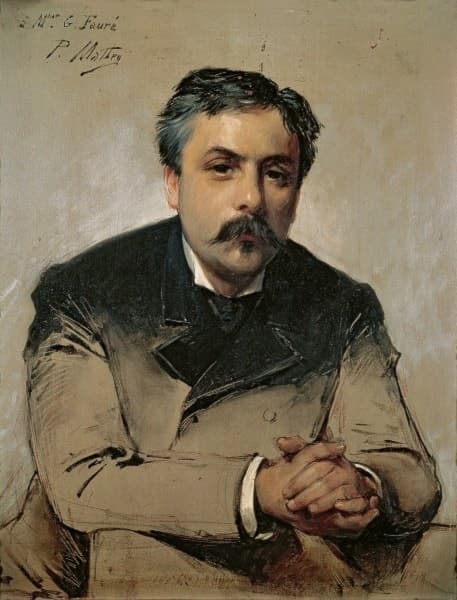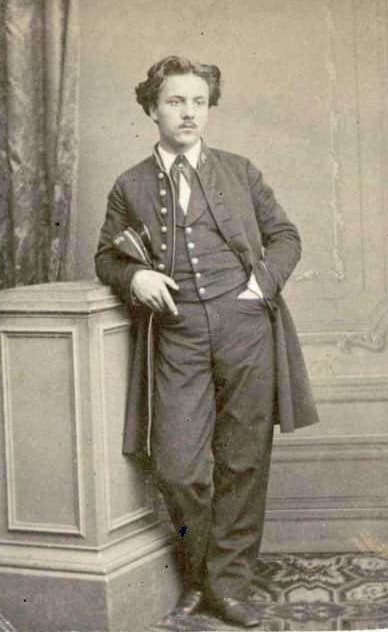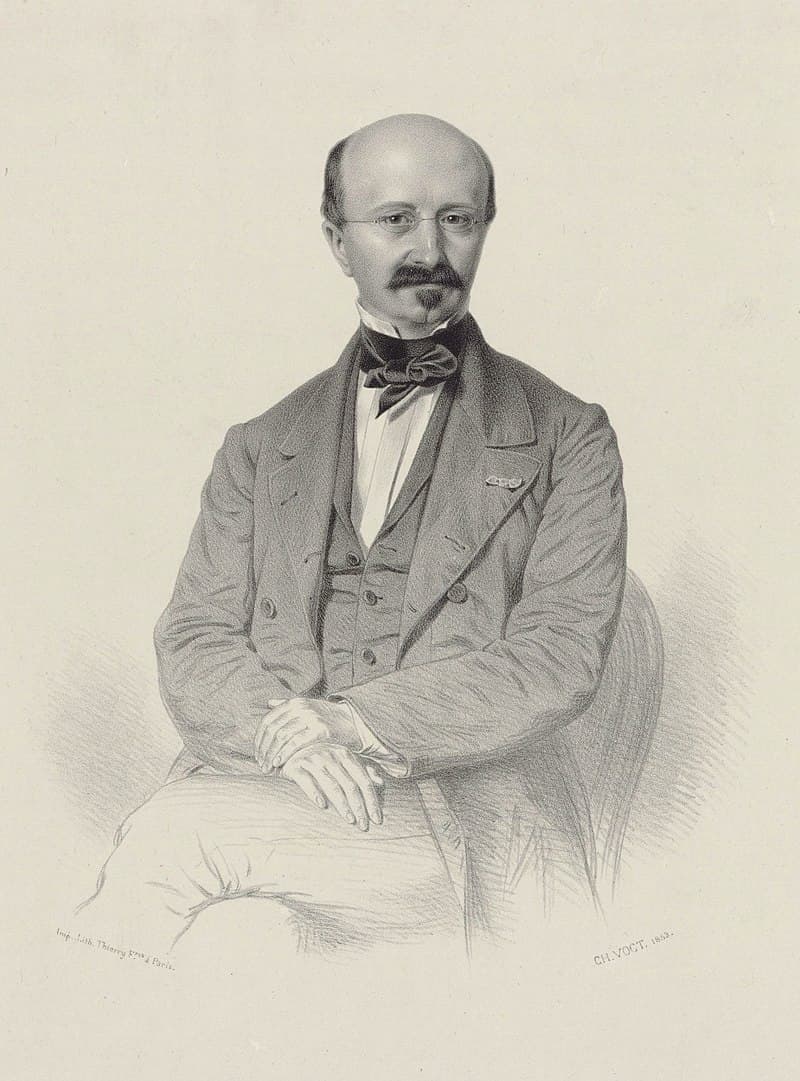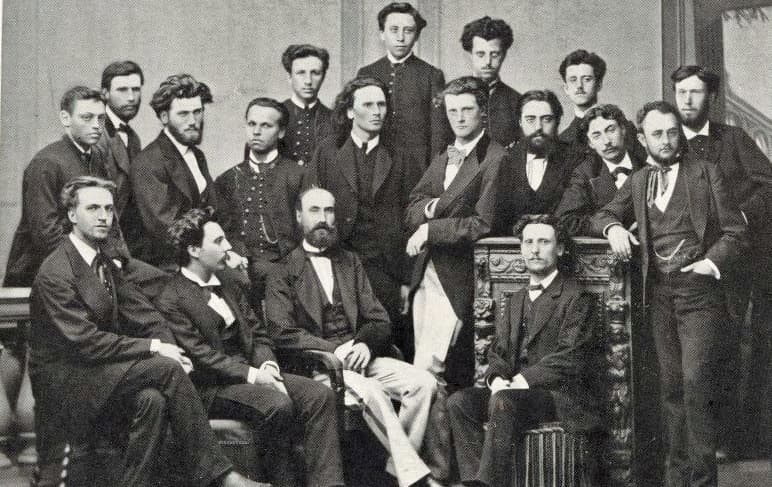Gabriel Fauré was born on 12 May 1845 in the small town of Pamiers, in the department of Ariège, in the south of France. He was the youngest of six children born to Toussaint-Honoré Fauré (1810–85) and Marie-Antoinette-Hélène Lalène-Laprade (1809–87), a member of the minor aristocracy. The Fauré family name can be traced back to the 13th century, but all their ancestral lands had been sold by the time of Gabriel’s birth.

Gabriel Fauré by Paul Mathey
In fact, his grandfather, also named Gabriel, was a butcher who was described as an “industrious tradesman who made a prosaic but profitable contribution to the nourishment of their fellow citizens.” His son Toussaint-Honoré abandoned the family business for the teaching professions and was a village schoolmaster subsequently appointed assistant inspector of elementary schools at Pamiers. The composer’s mother was the daughter of a retired army officer, “whose retirement had apparently been hastened by his own desire in order to avoid marrying his colonel’s daughter.”
Gabriel Fauré: Violin Sonata No. 1 in A Major, Op. 13
Fauré’s parents got married in 1829, and Gabriel was “almost an unwanted child.” Be that as it may, he was the only one of the six children to display any kind of musical talent. His four brothers pursued careers in journalism, politics, the army, and the civil service, and his sister had a traditional life as the wife of a public servant. Gabriel, baptized after his grandfather and named Urbain after a maternal uncle was sent to a foster-nurse in the village of Verniolle for four years. He only returned home after his father was appointed director of the Ecole Normale at Montgauzy. And while his foster mother had prophesized that Gabriel would become a bishop, the boy was clearly drawn to music.

Gabriel Fauré in the uniform of École Niedermeyer de Paris
A small chapel was attached to the school, and Fauré later recalled. “I grew up, a rather quiet well-behaved child, in an area of great beauty… But the only thing I remember really clearly is the harmonium in that little chapel. Every time I could get away I ran there, and I regaled myself… I played atrociously, no method at all, quite without technique, but I do remember that I was happy; and if that is what it means to have a vocation, then it is a very pleasant thing.”
Gabriel Fauré: 2 Mélodies, Op. 3, No. 1 “Seule” (Elly Ameling, soprano; Dalton Baldwin, piano)
The story is told that an old blind lady, who frequented the chapel for her private prayers, heard him play and told his father about his son’s gift. Bernard Delgay became the boy’s first music teacher. During the summer of 1853, an official at the Paris Assemblée heard Gabriel and advised his father to send him to the Ecole de Musique Classique et Religieuse, which Louis Niedermeyer had just established in Paris.

Louis Niedermeyer, 1850
Toussaint-Honoré wrote to the director, and after young Gabriel was examined, all school fees were waived. “After a year’s reflection, Toussaint-Honoré decided that the Ecole Niedermeyer, as it was later called, could prepare his son for the profession of choirmaster while cultivating his natural gifts.” In October 1854, Toussaint-Honoré took Gabriel to Paris, and Fauré remained a boarder at the Ecole Niedermeyer for 11 years.
Gabriel Fauré: 3 Mélodies, Op. 7, No. 1 “Après un rêve” (Claire Booth, soprano; Andrew Matthews-Owen, piano)
Supported by a scholarship from the Bishop of Pamiers, young Gabriel initially received comprehensive musical training in church music. However, he supplemented his studies in plainsong, organ, and Renaissance polyphony with serious literary studies. He received organ lessons from Clément Loret, learned harmony with Louis Dietsch, counterpoint and fugue from Xavier Wackenthaler, and he received instructions in piano, plainsong, and composition by Niedermeyer himself. Niedermeyer died in March 1861, and his piano studio was taken over by Camille Saint-Saëns.

Gabriel Fauré with his classmates at the École Niedermeyer
Saint-Saëns was only ten years older than Fauré, but he had already launched a brilliant career as a concert pianist and composer. It was the beginning of a closer friendship that lasted until Saint-Saëns death sixty years later, and Fauré remembered, “After allowing the lessons to run over, he would go to the piano and reveal to us those works of the masters from which the rigorous classical nature of our programme of study kept us at a distance and who, moreover, in those far-off years, were scarcely known… At the time I was 15 or 16, and from this time dates the almost filial attachment, the immense admiration, the unceasing gratitude I have had for him, throughout my life.”
For more of the best in classical music, sign up to our E-Newsletter
Gabriel Fauré: Piano Quartet No. 1 in C minor, Op. 15
